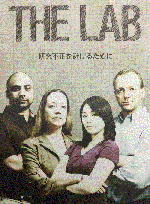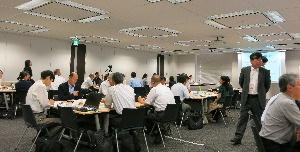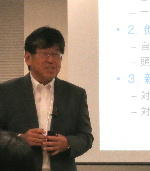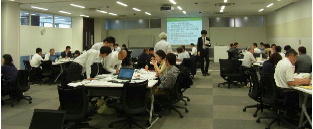Event Reports
The 2nd JST Workshop, "Promoting Activities toward Research Integrity-- Considering the Need for the Research Integrity and Its Educational Programs" (Part 2) Introducing the Current Situation and Sharing a Sense of Purpose (22 Sep '17)
The 2nd JST Workshop was held on 28 August, 2017 in Tokyo and 22 September, 2017 in Kobe. In the first group work reported previously, we reviewed what the purpose of the Responsible Conduct of Research (RCR) education is and what it should include. In the latter half of workshops, the participants planned an effective RCR education program.
In conducting the second group work, Professor Fudano introduced some examples of RCR education methods, tools and subjects, and explained the importance of education in the field of research.
Examples of RCR education methods and teaching materials

First, he explained that research ethics education in Japan is often conducted independently from other series of educational programs, and most of the forms are general styles, such as lectures, seminars, and self-study. He introduced these teaching materials as examples: Textbooks (so-called Green Book, and others), e-learning (eAPRIN, eLCoRE, MOOCs*, and others), and video materials (THE LAB, and others). He also showed a hybrid style example using both e-learning and lectures as to make use of these materials more efficiently. This style leads to further understanding through questions and discussions about the contents, and ways of thinking by taking the e-learning courses in advance. He mentioned that combining multiple methods and materials is effective, and spontaneously incorporating the opportunity for discussions is specifically important.
* MOOCs (Massive Open Online Courses): Free online courses of large-scale available for anyone to enroll in
Then, he introduced "Ethics across the curriculum" and "Micro-insertion" as examples of teaching methods based on new ways of thinking. It is not just independently teaching conventional ethics education. Ethics across the curriculum is a method to integrate ethics education into the curriculum. Micro-insertion is education to incorporate ethical elements into specialized subjects.
He also mentioned that more effective education can be achieved by defining the items and contents for learning depending on the targets' careers in these various educational methods. He also showed the Tohoku University's education system that had divided career stages (from students at the first half of the undergraduate program to the teaching staff) as a example.
RCR education in the actual research site
He also introduced ways to incorporate RCR education into daily research activities, and explained its efficiency.It means that conventional teaching materials and lectures tend to be in general terms for their purposes of common contents for a wide range of targets. However, it is possible to conduct the learning not as general terms but as issues directly connected to every day research activities under RCR education with actual examples in researching.
For example, if you tell a story such as "manipulating images like this is considered falsification," in researching, you can effectively teach them what it means to manipulate images, rather than simply teach them "you cannot falsify images." in lectures.
Then, he introduced the topics, tools, and how to use them, as an example of how to conduct RCR education in the actual research site. The University of California San Diego developed those teaching materials for the workshop. The outline was as follows:
- ・Code of Ethics and Code of Conduct: Analyze the differences and similarities between a code of ethics and code of conduct in your research field and organization, and that in others' fields and organizations. Understand the characteristics of your research field and organization and its differences corresponding to the priorities of ethical elements.
- ・Case example: Develop judgment and problem-solving ability by analyzing and examining how you would decide and behave, or what would cause problems with actual and virtual cases. He introduced the Seven Step Guide as an effective tool for analyzing cases.
- ・Checklist: Learn fully the points to be checked in conducting responsible research activities by ensuring what to do repeatedly in daily tasks. Not only show suggestions and explanation to new members of the laboratories, but also ensure own research systems in the process of creating and reviewing it.
- ・Individual Capability Development Plan: Clarify the roles and responsibilities that individuals must take and agree. Also prevent research misconduct for lack of communication or awareness by periodically ensuring and reviewing the contents.
- ・Group Policy: Prevent inappropriate behavior because of misunderstandings or assumptions by clarifying basic concepts and rules regarding important points in responsible research activities, such as authorship, or data management.
Reaffirm the goals of RCR education
When considering the RCR education program in each group, the lecturer reaffirmed how important the goals of RCR education were; and its goal to encourage the researchers to enhance individual "well-being" as explained in Part 1.
He mentioned it would be a good idea to incorporate such elements of "Aspirational Ethics" into the programs being developed in the future. For example, he introduced that it is defined as "Science in Society and for Society" in the introduction of " Code of Conduct for Scientists " by Science Council of Japan, that researchers do feel greater happiness to contribute to the society, that is, contributing to a greater presence.
He also explained that, in the creative work of researching, we need to regard knowledge and rules as necessary tasks for ourselves, and add methods and contents that you can incorporate, rather than forcefully stuffing knowledge or imposing the rules. He mentioned programs should be able to motivate individual researchers to conduct responsible research activities by encouraging their own independent action and sharing values which lead to each voluntary reason. He introduced the activities at Kanazawa Institute of Technology where they consider their own research ethics education as a specific example to encourage the researchers.
Considering the ideal RCR education for virtual laboratories
After the lecture for necessary knowledge and the points to be considered, the participants went into a group work session. In this group work, they challenged to have presentations after considering their mission statements, the code of ethics, and contents of RCR education in virtual laboratories (or organizations). The participants enthusiastically discussed to tackle the tasks by sharing their own experiences, daily questions, and concerns.
Each group made the mission statements of their laboratories after specifically considering how their selected research themes can contribute to the society and what kinds of people it can develop.
They presented unique outcomes by priority, at least 3 of them, considering the characteristics of areas of research, themes, members for the assumed laboratories, and their missions. Among the presentations, regardless of their research themes, some had similarities like "vigorously announce research results and give them back to the society," while others had the "research ethics in the research targeting humans" which reflected on the characteristics of their laboratories and research themes. They varied very much.

However, so many different ideas were presented that were about what items to teach, or what backgrounds the subjects had, representing the characteristics of areas of research in each laboratory. Some of them had unique ideas with ingenuity in each group. For example, they proposed ideas such as "reaction training for tempting misconduct (simulated experience)," and "conducting group work education with cases by switching the roles between teaching staff and administrative staff."
The high level of creativity in the presentations impressed the lecturer. He also referred to the diversity of each laboratory's content. He put emphasis on the needs to review the programs suited for each situation such as what they experienced in this workshop, since we still don't have the method that applies to any case in RCR education.
He went on and explained the measurement and evaluation of the effectiveness of RCR education. Although some tools available have been introduced overseas, we haven't had them developed enough to use in Japan yet. Mentioning these facts, he then introduced the tool named "SOURCE," developed in the United States, to survey organizational research climate, and the Japanese version of that is currently under consideration.
Conclusion
At the end of the workshop, Professor Fudano told the participants there that he would like to create a community with them, who were the pioneers on it, to think of methods that improves the quality of academic research in Japan, because we've had no definite means to facilitate research integrity yet.The following comments are from the participants.
- ・Everything Professor Fudano taught us was very clear and easy to understand, because he explained that the scale and circumstances differ in each research institution. I was glad learn methods for thinking
- ・It was the first time I learned about the "Aspirational Ethics," and I realized what I could do for the next step with the ethics education program I'm currently working on
- ・It was very informative because I've had few opportunities to learn about initiatives at other universities. He told us about advanced cases, what issues we've had, and how we've solved them so far through his lecture and exchanging opinions at group work
We, JST, will continue to conduct various activities to promote activities toward research integrity through consideration to the opinions we receive.

- The 2nd JST Workshop ", "Promoting Activities toward Research Integrity-- Considering the Need for the Research Integrity and Its Educational Programs" (Part 1) Introducing the Current Situation and Sharing a Sense of Purpose (28 Sep '17)
- JST Workshop on Promoting Activities toward Research Integrity - Education in the Research Field - (8 Mar '17, 14 Mar '17)

